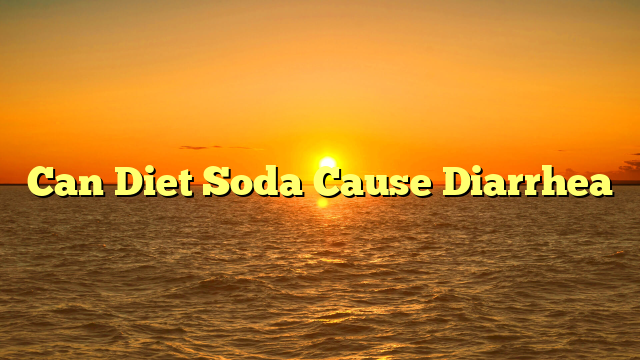Will Diet Coke Hydrate You? Discover the Surprising Answer!
Will diet coke hydrate you? When it comes to staying hydrated, it’s important to choose the right beverages. Diet Coke, a popular diet soda, has raised questions about its hydrating properties. In this article, we will explore whether Diet Coke can truly hydrate you or if it has the opposite effect.
Diet Coke, like other sodas, contains caffeine, which can have diuretic effects. This means that it may increase urine production and potentially lead to fluid loss. However, the diuretic effects of Diet Coke are not significant enough to cause dehydration on their own.
While Diet Coke does contain a significant amount of water, it lacks other essential components of hydration, such as electrolytes. Electrolytes play a crucial role in maintaining the balance of fluids in your body. Unfortunately, Diet Coke does not provide a substantial amount of these electrolytes, making it less effective for hydration compared to other beverages.
So, while Diet Coke may not dehydrate you, it is not a recommended choice for managing hydration. Water and sports drinks are better options as they contain the necessary electrolytes to replenish fluids in your body.
Will diet coke hydrate you Key Takeaways:
- Diet Coke may have diuretic effects due to its caffeine content, but it does not significantly dehydrate you.
- Hydration involves more than just drinking water; it also requires electrolytes, which Diet Coke lacks.
- Choose water or sports drinks for effective hydration and replenishment of electrolytes.
- Diet Coke is not a recommended beverage for managing hydration.
- Stay informed and prioritize your health by relying on reputable sources for information.
Does Diet Coke Contain 10 Teaspoons of Sugar?
Contrary to popular belief, Diet Coke does not contain any sugar. Instead, it is sweetened with artificial sweeteners like aspartame or sucralose. These sweeteners are used to provide the same sweet taste without the added calories and carbohydrates found in regular soda. So if you’re looking to reduce your sugar intake or manage your weight, Diet Coke can be a viable option.
However, it’s important to note that artificial sweeteners, while low in calories, may have their own set of potential risks and side effects. Some studies have suggested a possible link between artificial sweeteners and an increased risk of certain health issues, such as metabolic syndrome and weight gain. However, more research is needed to fully understand the long-term effects of these sweeteners on human health.
The Truth About Sugar Content in Diet Coke
It’s crucial to clarify the misconception surrounding the sugar content in Diet Coke. As a sugar-free beverage, Diet Coke contains zero grams of sugar. This makes it an attractive choice for individuals who are watching their sugar intake due to health concerns or dietary restrictions. By opting for Diet Coke over regular soda, you can enjoy the same refreshing taste without the added sugar and calories.
While Diet Coke may be sugar-free, it’s important to remember that moderation is key. Drinking excessive amounts of any soda, even the sugar-free varieties, can potentially lead to negative health effects. Overconsumption of artificial sweeteners has been associated with digestive issues, such as bloating and diarrhea. It’s always a good idea to consult with a healthcare professional to determine the right balance for your individual needs.
“Diet Coke provides a sugar-free alternative to satisfy your soda cravings while minimizing your sugar intake.”
In conclusion, Diet Coke does not contain 10 teaspoons of sugar. Its sugar-free formulation makes it a popular choice for those looking to cut back on their sugar consumption. However, it’s important to remain mindful of the potential risks associated with artificial sweeteners and to consume Diet Coke in moderation. With proper balance and overall healthy lifestyle choices, you can enjoy Diet Coke as an occasional treat without compromising your health.
Is Diet Coke a Healthier Alternative to Regular Soda?
Diet coke has often been promoted as a healthier alternative to regular soda due to its reduced calorie and sugar content. However, it’s important to examine the overall health effects before making any conclusions.
While diet coke may be lower in calories and sugar compared to regular soda, it is still not considered a healthy beverage. Regular consumption of diet coke has been linked to various health issues such as obesity, high blood pressure, and kidney stones. Moreover, diet coke does not provide any nutritional value, as it lacks essential vitamins and minerals that are necessary for the body’s optimal functioning.
The Impact of Artificial Sweeteners
One of the main reasons diet coke is marketed as a healthier option is because it is sweetened with artificial sweeteners instead of sugar. However, it is worth noting that artificial sweeteners can still affect your health in other ways and may have their own set of potential risks and side effects. While they do not contribute to calorie intake, some studies have suggested that artificial sweeteners may interfere with the body’s natural ability to regulate food intake, leading to increased cravings and overeating. Additionally, there is ongoing debate and research about the long-term effects of artificial sweeteners on metabolism and gut health.
“While diet coke may appear to be a better choice due to its reduced calorie and sugar content, it is essential to focus on overall dietary patterns and prioritize whole, unprocessed foods for optimal health.”
In conclusion of will diet coke hydrate you, while diet coke may have fewer calories and sugar than regular soda, it is still not a recommended beverage for maintaining a healthy lifestyle. It is important to prioritize water intake and choose healthier options when it comes to managing hydration and overall health. Rather than relying on diet coke as a substitute, opt for water, herbal tea, or fruit-infused water to stay hydrated without the added health risks.
The Impact of Diet Coke on Tooth Enamel
One of the concerns surrounding diet coke is its potential impact on tooth enamel. The phosphoric acid present in diet coke has the potential to erode tooth enamel over time, similar to other carbonated beverages and acidic foods. However, it is important to note that the concentration of phosphoric acid in diet coke is relatively low compared to other acidic drinks, such as citrus juices or energy drinks.
Tooth enamel is the protective outer layer of our teeth, and it plays a crucial role in preventing tooth decay and cavities. The acidity in diet coke can weaken the enamel, making it more susceptible to erosion and decay. It is therefore advisable to consume diet coke in moderation and practice good oral hygiene habits, such as brushing your teeth twice a day, flossing, and visiting the dentist regularly.
While the occasional consumption of diet coke may not pose a significant risk to tooth enamel, it is essential to be aware of its potential effects. Limiting acidic beverage intake, maintaining good oral hygiene, and seeking professional dental advice can help mitigate any potential damage to tooth enamel and overall oral health.

In conclusion, while diet coke may have some impact on tooth enamel due to its acidic nature, it is important to remember that overall oral health is influenced by various factors. Practicing good oral hygiene habits and seeking professional dental advice are key to maintaining healthy teeth and protecting tooth enamel.
Mythbusting: Debunking Common Misconceptions about Diet Coke
When it comes to diet coke, there are a number of myths and misconceptions that have circulated over the years. It’s important to separate fact from fiction and rely on scientific evidence to make informed decisions about your health. Let’s take a closer look at some of the common misconceptions surrounding diet coke.
Myth 1: Diet Coke Causes Hantavirus Infection
One of the most persistent myths about diet coke is the belief that it can lead to hantavirus infection. However, there is no scientific evidence to support this claim. Hantavirus is primarily transmitted to humans through contact with infected rodents, not through the consumption of diet coke or any other beverage. It’s essential to rely on accurate information from reputable sources when evaluating health risks.
Myth 2: Diet Coke Causes Cancer
Another myth that has gained traction is the idea that drinking diet coke can cause cancer. However, numerous scientific studies have debunked this claim. The artificial sweeteners used in diet coke, such as aspartame, have been extensively studied and found to be safe for consumption within the recommended limits set by regulatory authorities. It’s important to separate fact from fear and rely on reputable scientific research for accurate information.
Myth 3: Diet Coke Contains Hidden Calories
There is a common misconception that diet coke contains hidden calories that can sabotage weight loss efforts. However, diet coke is specifically formulated to be low in calories. It is sweetened with artificial sweeteners instead of sugar, making it a popular choice for those looking to reduce their calorie intake. It’s important to read labels and choose beverages that align with your dietary goals, but diet coke itself does not contain hidden calories.
Will diet coke hydrate you: Conclusion
In conclusion of our article will diet coke hydrate you, while diet coke may not necessarily dehydrate you, it is not a recommended beverage for managing hydration. Although it contains water that counteracts the diuretic effects of caffeine, it lacks significant electrolyte content necessary for proper hydration. As a result, relying on diet coke as a source of hydration is not ideal.
Furthermore, diet coke should not be considered a healthier alternative to regular soda. Despite being lower in calories and sugar, regular consumption of diet coke has been associated with various health issues, such as obesity, high blood pressure, and kidney stones. It is important to prioritize water intake and choose healthier options for managing hydration and overall health.
Additionally, while diet coke does not contain sugar, it is sweetened with artificial sweeteners like aspartame or sucralose. While these sweeteners do not contribute to sugar intake, they may have their own potential risks and side effects. It is essential to be mindful of the potential impact of artificial sweeteners on health.
In summary, when it comes to hydration and overall health, it is best to rely on beverages that provide proper hydration and essential electrolytes. Water and sports drinks are recommended options for maintaining optimal hydration levels. Diet coke should be consumed in moderation and not relied upon as a primary source of hydration or as a healthier alternative to water.
Will diet coke hydrate you – FAQ’s
Will drinking Diet Coke hydrate you?
While Diet Coke contains a significant amount of water, it does not provide enough electrolytes for proper hydration. It is not the best choice for managing hydration.
Does Diet Coke contain sugar?
No, Diet Coke is sweetened with artificial sweeteners like aspartame or sucralose and does not contain any sugar.
Is Diet Coke a healthier alternative to regular soda?
Diet Coke may be lower in calories and sugar compared to regular soda, but it is still not considered a healthy beverage. Regular consumption has been linked to various health issues.
What is the impact of Diet Coke on tooth enamel?
The phosphoric acid in Diet Coke can potentially damage tooth enamel over time, similar to other carbonated beverages and acidic foods.
Are there any myths about Diet Coke?
Common misconceptions about Diet Coke include claims of hantavirus infection, causing cancer, hidden calories, and dangerous substances. These claims are not supported by scientific evidence.







